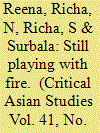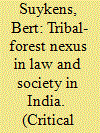|
|
|
Sort Order |
|
|
|
Items / Page
|
|
|
|
|
|
|
| Srl | Item |
| 1 |
ID:
090591


|
|
|
|
|
| Publication |
2009.
|
| Summary/Abstract |
This article presents the empirical realities of recent demographic changes within the South Korean population and identifies three mechanisms that have raised critical voices against the essentialist and exclusivist tendency found within Korean nationalism: protests by migrant workers, advocacy and support from social movement organizations, and discursive criticisms from academia and mass media. All these have contributed to the loosening of Korean ethnocentrism - a trend evident in recent survey data on Koreans' national identity. This article underscores that the real contradiction lies between Koreans' attachment to the nationalist identity that undergirded their political survival and economic success during the nation's turbulent modern decades and the present realities of a multi-ethnicizing population that demands pluralist and fluid understandings of social membership and collective identity.
|
|
|
|
|
|
|
|
|
|
|
|
|
|
|
|
| 2 |
ID:
090593


|
|
|
|
|
| Publication |
2009.
|
| Summary/Abstract |
Article argue that regulation of capitalism on a global scale, which requires meetings among elites in countries like Singapore, produces tensions that congeal in the regulation of resistance around these meetings. The global institutions that have helped to forge neoliberal policies must touch down and meet in concrete places. Such meetings require territorial power to clear definite spaces, spaces within which the "global" can be constituted. The imperative to include civil society in the staging of these meetings becomes circumscribed within the nature and scale of such spaces that are cleared for the constitution of global neoliberal governance.
|
|
|
|
|
|
|
|
|
|
|
|
|
|
|
|
| 3 |
ID:
090595


|
|
|
|
|
| Publication |
2009.
|
| Summary/Abstract |
This coauthored article is part of Sangtin Kisaan Mazdoor Sangathan's (SKMS) efforts to participate in the coproduction of dialogical/dialectical relationships between theory and practice, the lettered and the unlettered, academia and activism, and the fields inhabited by members of SKMS, nongovernmental organizations (NGOs), and academic scholars.We narrate two intertwined tales based on dialogues among four members of SKMS in the context of producing the first four issues of SKMS's community newspaper, Hamara Safar. The first tale focuses on the political transformation of Sangtin, an organization that was conceptualized in 1998 as an NGO for rural women's empowerment based on the mainstream donor-based model of social change. A three-year-long process of critical reflection and writing by nine women on the politics of caste, class, religion, and gender in the context of rural development and women's empowerment programs - as well as on the global politics of knowledge production - paved the way for the emergence of SKMS, an organization that today consists of over five thousand poor farmers, manual laborers, and their families, most of them dalit. SKMS believes that definitions and processes of empowerment must evolve from rural people's struggles and active participation, instead of emerging from donor institutions, NGO headquarters, university-based experts, or think tanks-and then being applied to the rural people. The second story focuses on some of the hurdles in the path of SKMS as it remains grounded in feminist principles, but refuses to work exclusively with women. Together, the two intertwined stories map the archaeology of the shift from Sangtin to SKMS and some of the larger questions pertaining to "women's issues," "feminist politics," and "transnational collaborations" that this shift has opened up.
|
|
|
|
|
|
|
|
|
|
|
|
|
|
|
|
| 4 |
ID:
090592


|
|
|
|
|
| Publication |
2009.
|
| Summary/Abstract |
This article examines two conflicting narratives concerning the relationship between tribals and forests in India-narratives that have been counterpoised in India at least since colonial times. The first narrative sees tribals as the natural protectors of the forest; the second argues that tribal practices are detrimental to forest conservation. The author investigates how these two representations of Indian tribals have shaped and are still shaping legal and societal relations between tribals and forests. The author shows how these narratives are deeply embedded in Indian forest legislation and how local officials, rights activists, and tribals themselves all make selective use of the two narratives to gain or deny access to forest resources.
|
|
|
|
|
|
|
|
|
|
|
|
|
|
|
|
|
|
|
|
|